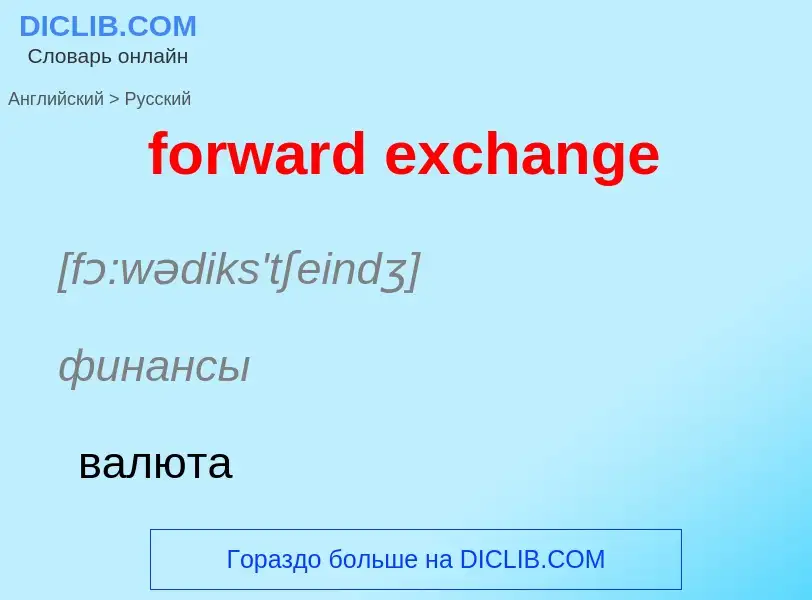Перевод и анализ слов искусственным интеллектом ChatGPT
На этой странице Вы можете получить подробный анализ слова или словосочетания, произведенный с помощью лучшей на сегодняшний день технологии искусственного интеллекта:
- как употребляется слово
- частота употребления
- используется оно чаще в устной или письменной речи
- варианты перевода слова
- примеры употребления (несколько фраз с переводом)
- этимология
forward exchange - перевод на русский
[fɔ:wədiks'tʃeindʒ]
финансы
валюта
покупаемая или продаваемая на срок
Определение
Википедия

The foreign exchange market (forex, FX, or currency market) is a global decentralized or over-the-counter (OTC) market for the trading of currencies. This market determines foreign exchange rates for every currency. It includes all aspects of buying, selling and exchanging currencies at current or determined prices. In terms of trading volume, it is by far the largest market in the world, followed by the credit market.
The main participants in this market are the larger international banks. Financial centers around the world function as anchors of trading between a wide range of multiple types of buyers and sellers around the clock, with the exception of weekends. Since currencies are always traded in pairs, the foreign exchange market does not set a currency's absolute value but rather determines its relative value by setting the market price of one currency if paid for with another. Ex: 1 USD is worth X CAD, or CHF, or JPY, etc.
The foreign exchange market works through financial institutions and operates on several levels. Behind the scenes, banks turn to a smaller number of financial firms known as "dealers", who are involved in large quantities of foreign exchange trading. Most foreign exchange dealers are banks, so this behind-the-scenes market is sometimes called the "interbank market" (although a few insurance companies and other kinds of financial firms are involved). Trades between foreign exchange dealers can be very large, involving hundreds of millions of dollars. Because of the sovereignty issue when involving two currencies, Forex has little (if any) supervisory entity regulating its actions.
The foreign exchange market assists international trade and investments by enabling currency conversion. For example, it permits a business in the United States to import goods from European Union member states, especially Eurozone members, and pay Euros, even though its income is in United States dollars. It also supports direct speculation and evaluation relative to the value of currencies and the carry trade speculation, based on the differential interest rate between two currencies.
In a typical foreign exchange transaction, a party purchases some quantity of one currency by paying with some quantity of another currency.
The modern foreign exchange market began forming during the 1970s. This followed three decades of government restrictions on foreign exchange transactions under the Bretton Woods system of monetary management, which set out the rules for commercial and financial relations among the world's major industrial states after World War II. Countries gradually switched to floating exchange rates from the previous exchange rate regime, which remained fixed per the Bretton Woods system.
The foreign exchange market is unique because of the following characteristics:
- its huge trading volume, representing the largest asset class in the world leading to high liquidity;
- its geographical dispersion;
- its continuous operation: 24 hours a day except for weekends, i.e., trading from 22:00 UTC on Sunday (Sydney) until 22:00 UTC Friday (New York);
- the variety of factors that affect exchange rates;
- the low margins of relative profit compared with other markets of fixed income; and
- the use of leverage to enhance profit and loss margins and with respect to account size.
As such, it has been referred to as the market closest to the ideal of perfect competition, notwithstanding currency intervention by central banks.
According to the Bank for International Settlements, the preliminary global results from the 2022 Triennial Central Bank Survey of Foreign Exchange and OTC Derivatives Markets Activity show that trading in foreign exchange markets averaged US$7.5 trillion per day in April 2022. This is up from US$6.6 trillion in April 2019. Measured by value, foreign exchange swaps were traded more than any other instrument in April 2022, at US$3.8 trillion per day, followed by spot trading at US$2.1 trillion.
The $7.5 trillion break-down is as follows:
- $2.1 trillion in spot transactions
- $1.2 trillion in outright forwards
- $3.8 trillion in foreign exchange swaps
- $124 billion currency swaps
- $304 billion in options and other products



